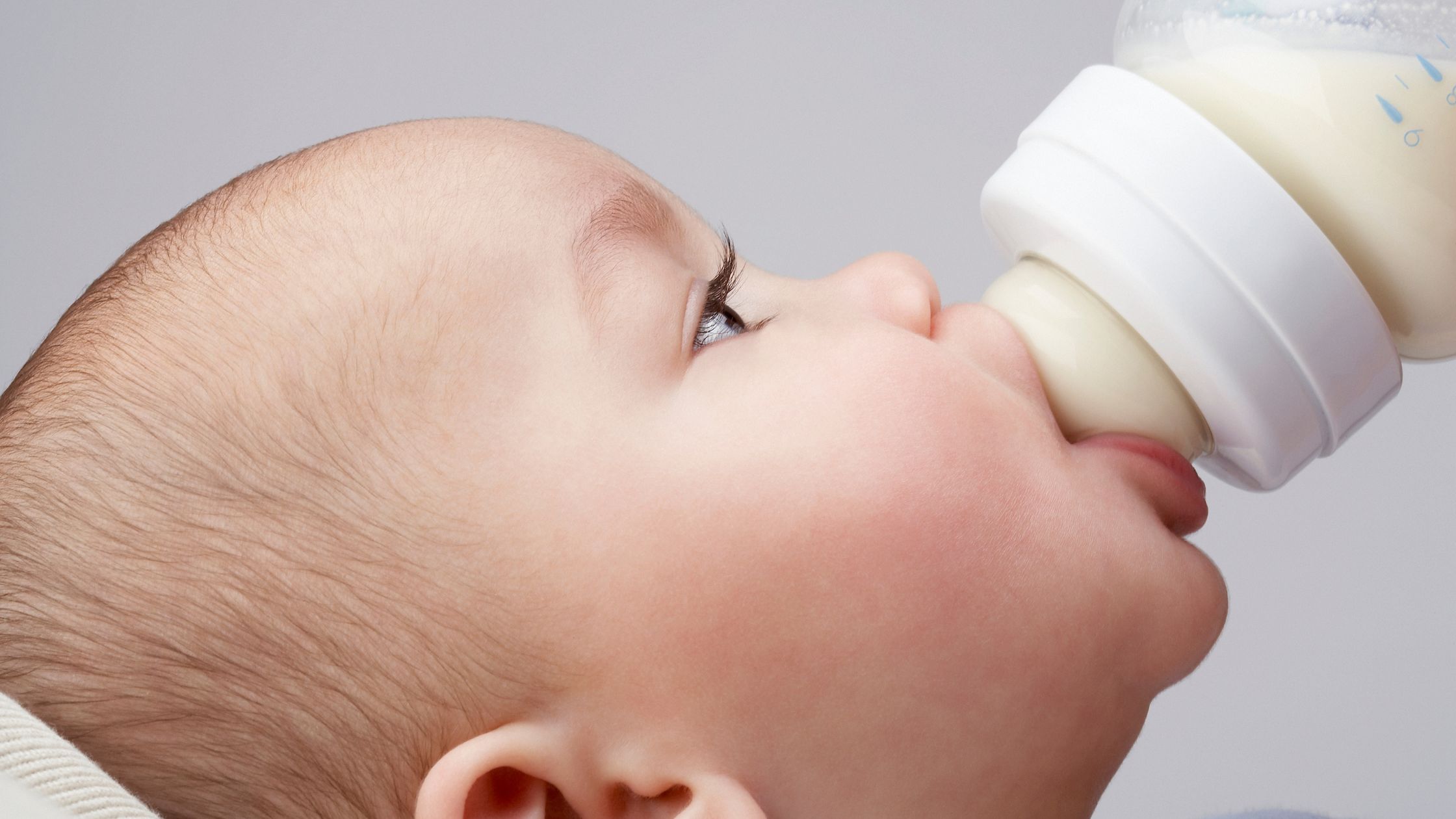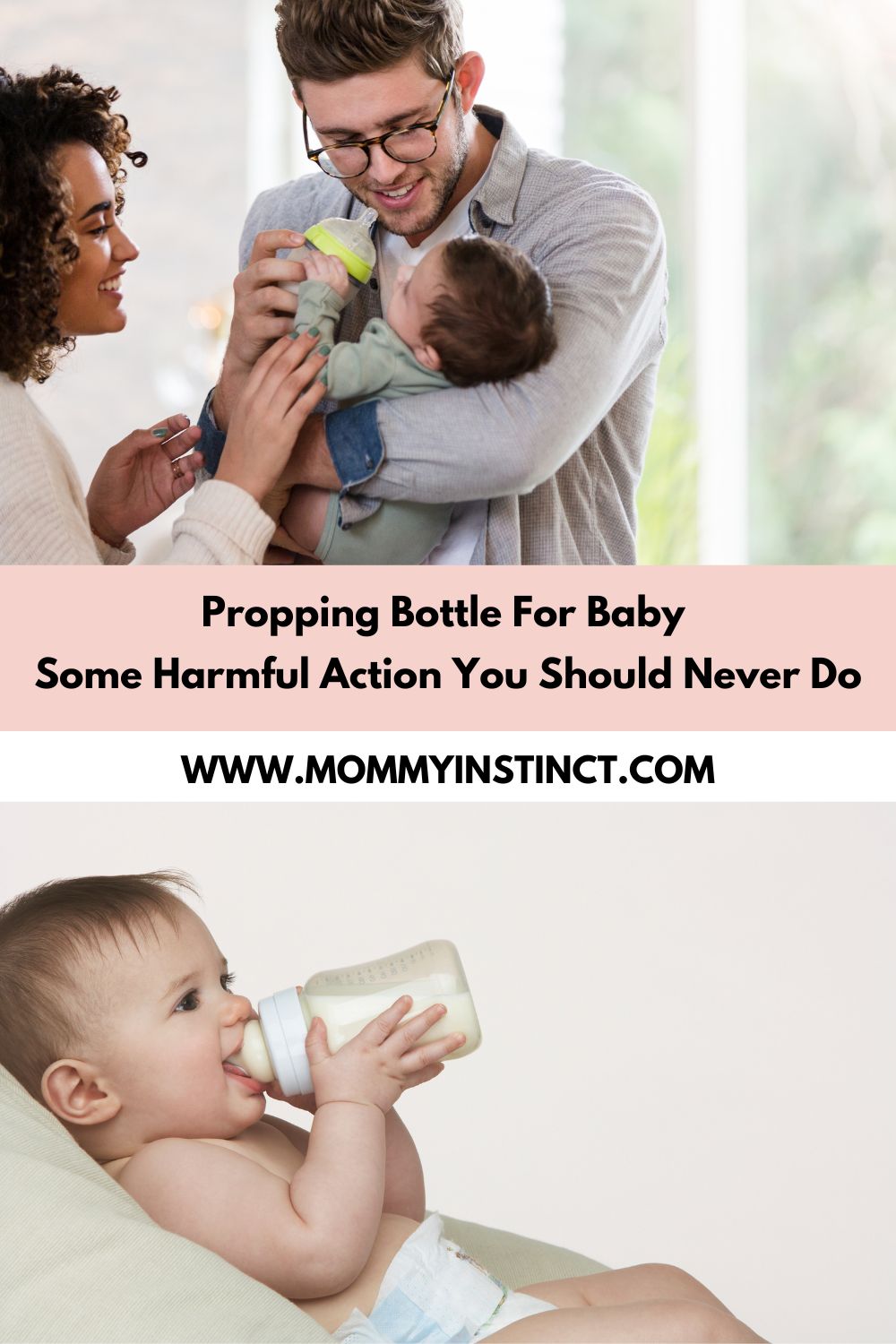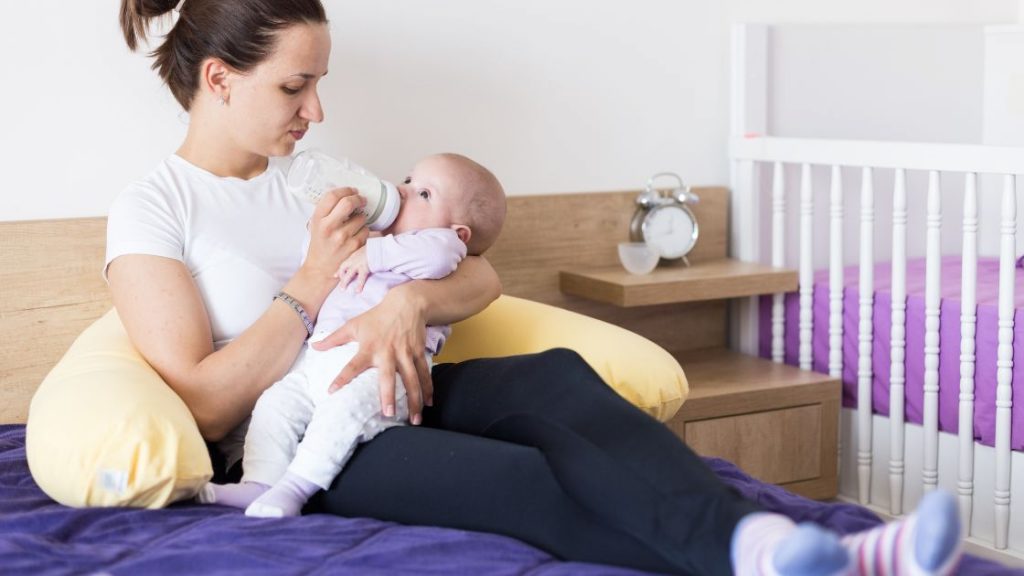Bottle-fed babies eat every 2-4 hours and more frequently in the beginning. We need to hold them in the right position and feed them for a long time. That makes new parents like you could not take a break and feel more draining.
On the market, it is not hard for you to find products called “bottle holders,” “bottle hangers,” and "self-feeding baby bottles.” They are marketed as safety devices for propping bottle for baby, so then parents can take a break or solve some urgent problems. Therefore, you are trying to find a shortcut to feed the baby with lesser effort.
It sounds amazing, doesn’t it? However, bottle propping is never recommended to feed the babies because of its potential risks. We will explain the bottle propping practice and the results, and you should never buy bottle propping devices. We also answer some frequently asked questions about baby feeding.
What is propping a bottle for the baby?

Bottle propping is when you use alternative tools to hold the bottle and help feed your baby hands-free. It involves laying the baby flat in the bed or letting them sit in a bouncer baby chair and then using a pillow or a blanket to prop the milk bottle.
Parents commonly apply it before the baby can hold the bottle by themselves. Instead of holding the baby and bottles by hand, they need to focus on something else. Many parents are too busy or need to handle things urgently, such as opening the door or answering a quick phone call.
On the market now, many devices are marketed to help you bottle propping your baby. We think you can find and buy these tools on online shopping websites. Even though it sounds convenient, propping a bottle for a baby is never recommended. Both the Centers for Disease Control and Prevention (CDC) 1 and the Academy Of American Pediatrics (AAP) 2 advise it is too risky to feed your baby by bottle propping practice. It is not only because you are losing quality time with your baby but also quite dangerous for the baby's health.
Why is it bad to prop a bottle?
We discourage bottle propping because of its danger to the baby's health, such as choking, tooth decay, ear infections, and disconnecting the relationship between parents and baby.

Risk of Choking
Normally, when feeding the baby, you will keep them in a semi-upright position, with the bottle parallel to the ground. With the right technique for bottle-feeding, the baby can have control of flow, actively use the sucking skills, and can have a break when they need it.
With bottle propping, you just lay the baby down on their back and use a pillow or tools to hold the bottle. The tilting of the milk bottle will lead to a faster milk flow and a higher risk of aspiration or choking the milk.
The baby's neck is not strong enough to control the head and pull away from the bottle when they want. Without parents, babies will easily gag when the milk keeps coming and are not ready to swallow.
A baby's choking and gagging on milk can lead to serious consequences like the risk of pneumonia and even death. If you prop the bottle and leave, no one can recognize the signal of gagging. That puts the infants at the risk of suffocating or drowning in the formula.
Risk of Tooth Decay
One common consequence of bottle propping is the risk of tooth decay. It is a breakdown of tooth enamel, the harder outer coating of a tooth. The baby's teeth will be cavities with tiny openings or holes on the tooth's surface.
When you prop the bottle, breastmilk or formula will frequently pool in the back of your baby's mouth. The liquids contain sugar and gems, coat the baby's teeth, and are left there for a long time. Sugars are changed into acid, dissolve tooth enamel and lead to tooth decay. You can realize when the tooth rots by noticing brown or white spots.
Rooting teeth is painful for a baby. They will feel uncomfortable when eating and may cry all the time. You will need to put more effort into taking care of them, which costs more for the dentist or treatment.
You can prevent early childhood caries with good dental hygiene and adequately feeding your baby. You should gently wipe the baby's gums with a baby washcloth to keep the mouth clean. Never bottle propping or put your baby on the bed with a milk bottle.
Risk of Ear Infections
Bottle propping can lead to the risk of baby’s ear infections. It happens when the germs get into and cause the infection in the middle ear, the air-filled space behind the eardrum.
Normally, the central air is clean and dry thanks to the good ventilation by air from behind the nose, through the Eustachian tube. If this tube is clogged or blocked, there will not be enough fresh air ventilating the middle ear. It becomes warm, moist, and stagnant, a perfect environment for bacteria. (sources)
Everyone has Eustachian tubes, but children and infants are more likely to get ear infections. The baby’s Eustachian tube is often too soft or unfinished. It is shorter than developed ones, narrow and flat instead of sloped.
If you feed the baby with bottle propping, the milk will have more chance to collect near the baby's Eustachian tube and cause an ear infection. If they have repeated ear infections, it will lead to speech and hearing problems.
Lack of Interaction
You should not use bottle propping because feeding is a special time to communicate with your baby. Besides the consequence to the infant's health, propping a bottle for a baby can lead to a disconnection with the parents.
If you give the baby full attention while she feeds, you will know when she is full and stop feeding. Cuddling, eye contact, gentle touch, and sharing warm moments are helpful for optimum brain development, especially in the important areas of social and emotional connection.
Interacting with your baby while feeding them can give you the feeling of being present with peace of mind. Instead of considering it a responsibility, you can think of it as a chance to get closer to your baby and know her more.
Other risks
There are more terrible results that can happen if your baby prop feeds. Instead of the stomach, the baby may aspirate the milk into the airway and lungs, leading to chest infections or death.
Parents do not monitor the milk their babies drink, so the baby may be over or underfeeding. Overfeeding can lead to gassiness, frequent spit-up, vomiting, fussiness, irritability, or crying after meals. At the same time, and underfeeding baby could not grow healthy because she doesn't ingest enough calories.
Bottle propping devices you must stay away from
Just do a quick search on online shopping websites, and you will easily find a lot of devices that are marketed to allow moms to nurse with “a bit of rest.” For example, Portable Baby Feeding Cushion, Baby Feeding Tool, Baby Bottle Holder, etc. They all look so convenient and useful to prop bottles for babies. However, we don't recommend you buy any of these devices. None of them are safe.
Many look like pillows or foam wedges designed to hold a bottle. In the advertisement, the baby lays down on the ground or sits in the baby seat and wears this pillow. The bottle of milk held by the pillow increases the risk of choking, under or overfeeding.
You can find many devices called bottle holders. It works by hanging on the baby's crib, baby seats, car seats, or strollers with the milk bottle. They are even more dangerous because hanging bottles will move around a lot while in a moving vehicle.
Some devices are called self-feeding baby bottles or baby bottles with straws. It has a long tube that connects the bottle and the bottle nipple. So your baby can drink milk by sucking the bottle nipple alone, like a pacifier. The baby can fall asleep while feeding like this, which leads to the risk of tooth decay.
In conclusion, we do not recommend you use any supported device to feed the baby without your supervision. They possibly cause the same risks as bottle propping because of the uncontrolled milk flow, explained Dr. Huberman Carbone (source).
FAQ
We received many similar questions from you about bottle propping and feeding babies. Below are some frequently asked questions and their answers. They will be helpful for those who are practicing bottle feeding and thinking about propping bottles for their babies.

What does it mean to prop a baby's bottle?
Mostly, the baby under 6 months can not start self-feeding and needs to be fed by parents. If the parents are too busy, they will look for a practice to help them multitask or be hands-free, like bottle propping.
Propping a baby’s bottle is when you use a device or object such as a pillow or blanket to hold the bottle in the baby's mouth, so they drink the milk themselves. It sounds safe and tempting but dangerous to your baby. They will be at high risk of choking, overfeeding, tooth decay, ear infections, and lack of parental interactions.
Can propping a baby bottle cause ear infections?
Yes, it can. One bottle propping consequence is ear infections in babies.
It happens because of the milk pooling in the back of the baby's mouth, near the opening of the Eustachian tube. It may clog the tube and create a humid and warm environment for germs to cause a painful ear infection.
How should a baby be positioned when bottle feeding?
You should lay the baby's head in a semi-upright position and keep it higher than the feet. Don't lay the baby flat because it can lead to choking and ear infections. You can hold them with baby head support if their neck is not strong enough.
Don't bottle in bed or let your baby sleep with a bottle. It is as dangerous as bottle propping, leading to choking, overeating, tooth decay, and ear infections.
You should maintain the interaction with the baby during bottle feeding. You can have eye contact or touch the baby gently to share this warm moment with the baby. And, of course, your baby will love to spend time with you - their favorite person.
Don’t forget to stop and burp the baby every 3 to 5 minutes during bottle feeding. Frequent burping will remove some gassiness and prevent a baby's discomfort and spitting up.
Can a baby drink a bottle sitting up?
Yes, they can. You can bottle-feed babies while sitting up.
Proper feeding is most suitable for older babies, who already have much control over their bodies. If your baby is old enough, you can let them sit on your lap, lay their back on your chest and allow their body to rest inside your arm.
The baby learns more skills when getting older and becomes curious about the surrounding world. Drinking a bottle while sitting up will be fun practice for babies. Meanwhile, it is also beneficial for the baby having gas or acid reflux issues. Because you cannot always see their face while feeding, you should always check to stop feeding when they are full.

Closing
Propping bottle for baby is a deadly dangerous practice you should never do to your baby. It also puts the baby at risk of ear infections, lung infections, or tooth decay. You should consider these consequences before buying prop devices or bottle propping for your baby.
If you have multiple births and there is always more than one baby needing to take care of, you can use bouncy chairs to lay the babies on. The bottles need to be held by you to control the milk flow. And if you need a moment to rest or want to set your baby down, a pacifier will be helpful to soothe them.
You can ask for support if you have someone to help you with the baby. It can be a night nurse or anyone you can hire to assist you. Or you can ask family members to stay with you while you adjust to the new baby.
Bottle feeding or breastfeeding is a great time to bond with your baby. Please look for support to not let feeding the baby make you exhausted.




